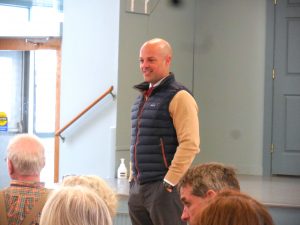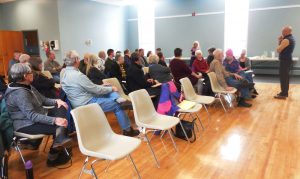HUNTINGTON – As a part of his “Speak up Western Mass” tour, State Senator Adam G. Hinds (D-Pittsfield) visited Stanton Hall in Huntington on Monday afternoon, for an informal two-hour discussion with the more than 30 residents from seven hilltowns that joined him.
Hinds said he wanted to meet with people as early as possible in his first term, which began Jan. 4. Hinds took the seat of outgoing Senator Benjamin B. Downing, also of Pittsfield, after defeating Lanesborough Republican Christine Canning on Nov. 8.

State Senator Adam G. Hinds visited Huntington on Monday as part of his “Speak up Western Mass” tour.
Hinds said his motivating drive right now is the Governor’s budget, which will go to the House next month before the Senate gets it. He said his main concern is what he calls a “tale of two states,” in which the headines in The Boston Globe about the growing economy have a very different feeling than what’s going on in Western Mass., where the median income is $22-$24,000 below the state median.
Some of the issues Hinds says he’s hearing about are broadband access, declining populations, the need for more school funding and sparsity aid. He also talked about some state regulations that don’t help in the small towns, for example requiring pre-qualified engineers from a list to look at a bridge before work can even begin.
Before going further, Hinds asked people to introduce themselves, and what town they’re from. Most used the introduction as an opportunity to talk about the issues that concern them. Towns named were Huntington, Chester, Worthington, Montgomery, Cummington, Hinsdale and Middlefield.
In addition to the topics already raised by Hinds, health care, cuts to CDBG funding for human services, climate change, funding for the arts, more money for roads, state park closures and access to transportation were all mentioned.
Hinds said many of the committees to which he is assigned deal with the same issues. Hinds is co-chairing the Joint Committee on Tourism, Arts and Cultural Development, and serving on committees dealing with economic development, housing, mental health and substance abuse, and higher education, among others.
In response to the first question, Hinds talked about Channel 22 losing broadcasting to the Berkshires, which were put into the Albany market. Not only don’t the residents get Massachusetts news, but they see the Jets instead of the Patriots during football season. The Western Mass delegation immediately responded to what he said is a federal matter, and asked Sen. Ed Markey to work on it. Hinds said it’s a problem for him communicating with his consituents, too, because 22News is the only one with a statehouse correspondent.
Hinds said on Tuesday, 15 senators from around the state would be in Conway to discuss regional planning and rural aid for schools. He said his delegation is laying out a strong case for Western Mass impacts.
Regarding high-speed internet, Hinds said there is a new policy, and it’s starting to feel like it’s getting somewhere. Recently, the Mass Broadband Institute (MBI), who had been holding on to money pledged to help Western Mass hilltowns get connected, agreed to release the funds to the towns for professional services. MBI sent out a Request for Proposal (RFP) in the fall to private providers, asking who could help get the towns connected. He said the grant process for the towns will start very soon in April, with a 30-day turnaround. By the end of the process, he said they will see where the private side is going to land. He said the towns would be hearing more from legislators about this soon.
“It’s a positive thing about getting the money out to the towns, but there’s a heck of a lot of work to do,” Hinds said.
Andy Myers, chair of the Hilltown Collaborative and finance committee member from Chester, said one real challenge for the towns is the school budget. He said the key is the state not paying 100 percent reimbursement for regional transportation which was promised when the towns were encouraged to regionalize.
Hinds said the total cost would be $1.9 billion across the state, but has thought if the state can’t do it all, could they pick up some over five years. He said they’ve also asked for a foundation budget review, which is the amount the state determines each town must pay.
The rural aid proposal to pay more per pupil for schools with declining populations, led by Mohawk Regional would cost $22 million, which Hinds said is not a lot of money relative to the budget, and would have a huge impact. He said he doesn’t want to see more schools close.
Responding to a question about Community Development Block Grants (CDBG), which are facing cuts in the federal budget, Hinds said a lot of money comes from the federal level, which has had an obvious shift in priorities. He said for now, Massachusetts can choose to balance its approach. Hinds said he recently attended a meeting on health care. “I left that meeting saying I’m glad we live in Massachusetts,” he said.
Other issues discussed during the meeting included Chapter 90 funds, vocational schools, state parks, and substance abuse treatment. Before ending the discussion at the two hour mark, Hinds said that he keeps hearing the same thing as he travels around Western Mass. “If we have this growing economy, where is the money?”


